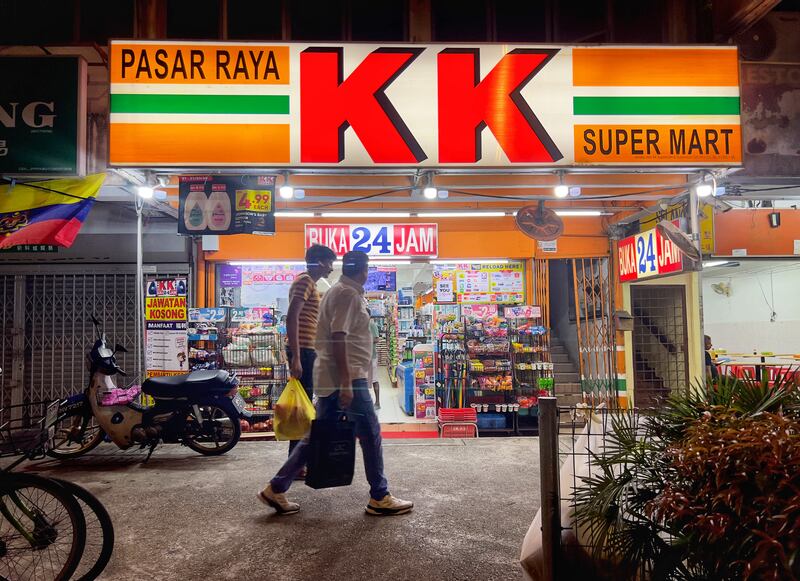A Malaysian court on Tuesday charged the directors of a convenience store chain with wounding religious feelings for selling socks with the word “Allah” written on them, in the latest incident to expose simmering ethnic tensions in the Southeast Asian country.
Prosecutors charged Chai Kee Kan, the 57-year-old owner of KK Super Mart, and his wife who serves as a company director, with “deliberately intending to hurt religious feelings,” according to court documents.
Three directors from supplier Xin Jian Chang – Goh Li Huay, Soh Hui San and Soh Chin Huat – have also been charged with abetting the alleged crime.
The defendants appeared at Shah Alam Sessions Court on Tuesday, where they all pleaded not guilty and were granted bail. If convicted, they face a maximum jail term of one year, a fine, or both.
Photos of the socks began spreading online earlier this month, stirring outrage among Malaysia’s majority Malay population – all of whom are considered Muslim – and prompting stern criticism from King Sultan Ibrahim Iskandar, who called for the perpetrators to be punished.
Depicting Allah in any shape or form is prohibited in Islam, let alone on socks, as feet are considered unclean and impure.
Rajpal Singh, a lawyer representing the convenience store directors, said he was confident the charges would be dismissed.
“My clients have pleaded not guilty, and they are innocent until proven guilty,” he told reporters outside the courtroom on Tuesday.

On March 16, as public anger grew, Chai made a tearful apology to the Muslim community and said he had pulled the socks from sale.
Supplier Xin Jian Chang also apologized last week, saying the “problematic socks were part of a larger shipment” ordered from Mian Qing Hosiery, a company based in Zhejiang province, China.
“We regret any oversight in our quality control process that allowed these items to enter our inventory, despite our best efforts to ensure that all 18,800 socks received from our Chinese supplier were in accordance with the provided samples,” the company said.
KK Super Mart on Monday filed a lawsuit against the supplier, seeking 30 million Malaysian ringgit ($6.3 million) in damages for sabotaging its business.
Islam ‘weaponized’
Sultan Ibrahim Iskandar, who as the head of Malaysia’s monarchy is regarded as the protector of Islam, in his rebuke last week reminded Malaysians to refrain from discussing sensitive issues on religion, race and royalty.
“Whether it was intentional or not, whether it was imported or produced in local factories, I want enforcement agencies to investigate and take the strictest action according to the existing laws so that the same mistake is not repeated,” he said.
Last week, authorities jailed two men, Chiok Wai Loong and Ricky Shane Cagampang, under the communication laws for posting offensive Facebook comments related to the socks’ controversy.
Analysts say the controversy surrounding the socks is being politicized and used to inflame ethnic tensions.
"If we look at the issue objectively, it is probably a case of a few socks wrongly sent to a supplier that ended up in a supermarket. However, because of the rising ethnic tension in the background, it became amplified," Tunku Mohar Mokhtar, an assistant professor at the International Islamic University Malaysia, told BenarNews.
"While Muslim sensitivities were hurt, the responses might not be proportionate."

The Malay nationalist party UMNO, which is part of the governing coalition, has made a particular effort to exploit the controversy and called for a boycott of convenience store chain.
“Islam has been weaponized in the political arena,” James Chin, an Asian studies professor at the University of Tasmania, told BenarNews. “It is clear that they [Malay politicians] want to pursue this case to show that they are the champions of Islam in Malaysia on the governing side and opposition side.”
If the government did not intervene to check the rise of political Islam, ethnic divisions could worsen, he said.
“There will be more and more people attacking each other on religious grounds, and we’re heading towards a situation like in Pakistan, India, and Bangladesh, where people use religion as a political weapon.
Islam is the official religion of Malaysia, but around 40% of the population profess other faiths such as Buddhism, Christianity or Hinduism.
Recent incidents of moral outrage and intolerance, however, have raised concerns among many about a rise in Islamic conservatism.
Earlier this year, the director and producer of a now-banned feature film about a Muslim girl who explores other faiths were also charged with "hurting religious feelings."
Last year, Malaysia banned Swatch watches and accessories with LGBTQ references and made possessing them punishable by up to three years in prison, saying that normalizing the gay community may harm the nation.
